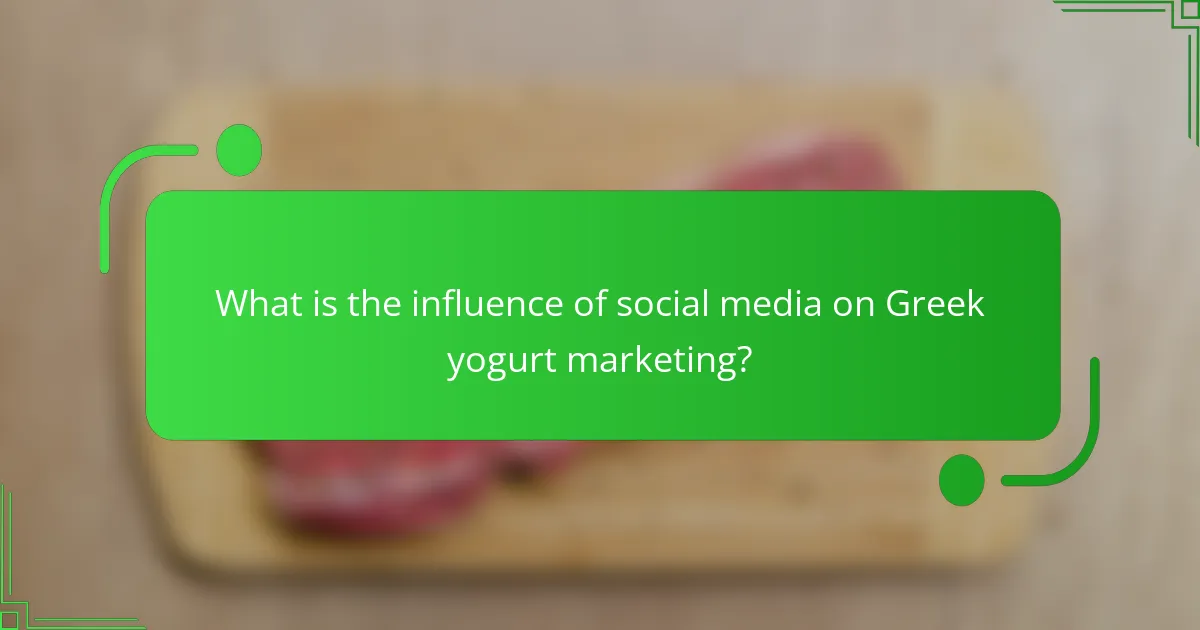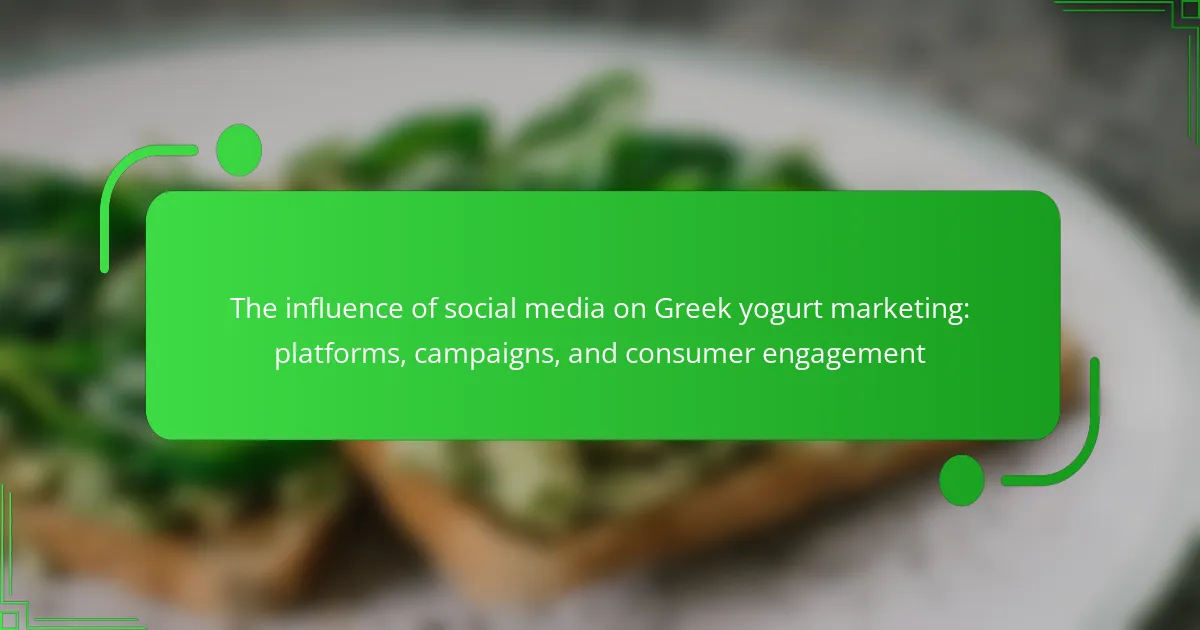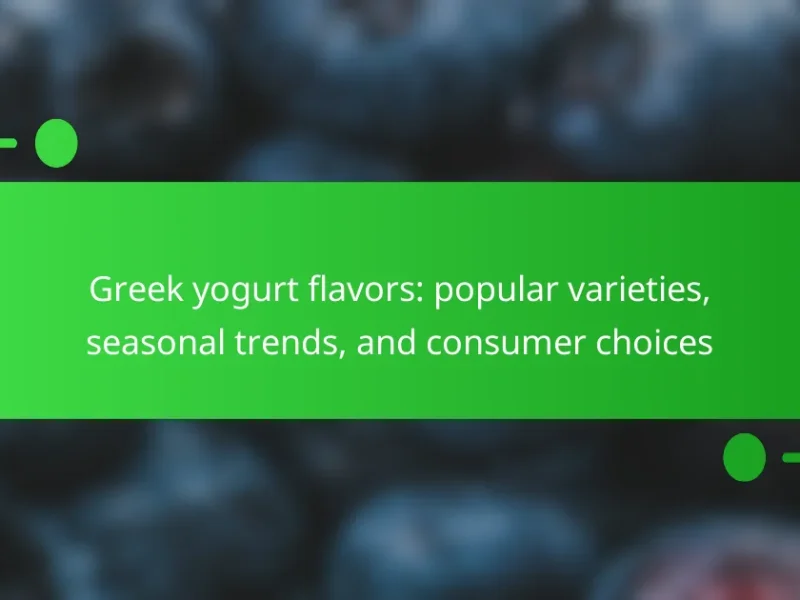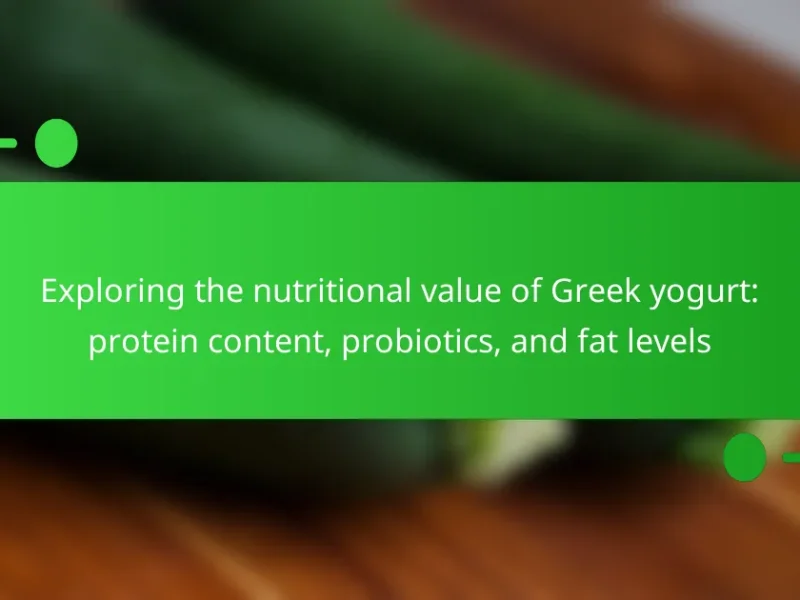Social media plays a crucial role in the marketing of Greek yogurt by enhancing brand visibility and fostering consumer engagement. Platforms such as Instagram and Facebook enable brands to showcase their products through visually appealing content, including recipes and health benefits, which helps attract a broader audience. User-generated content builds community and trust, while influencer campaigns effectively target specific demographics. Research indicates that social media marketing can increase brand awareness significantly, highlighting its impact on consumer perceptions and sales in the Greek yogurt sector. This article explores the influence of social media on Greek yogurt marketing, focusing on platforms, campaigns, and consumer engagement strategies.

What is the influence of social media on Greek yogurt marketing?
Social media significantly influences Greek yogurt marketing by enhancing brand visibility and consumer engagement. Platforms like Instagram and Facebook allow brands to showcase their products visually. Engaging content, such as recipes and health benefits, attracts a wider audience. User-generated content fosters community and trust in the brand. Campaigns that leverage influencers can reach targeted demographics effectively. According to a study by the Journal of Marketing Research, social media campaigns can increase brand awareness by up to 75%. This demonstrates the powerful role social media plays in shaping consumer perceptions and driving sales in the Greek yogurt market.
How has social media changed the landscape of food marketing?
Social media has transformed food marketing by enhancing consumer engagement and brand visibility. Platforms like Instagram and Facebook allow brands to showcase their products visually. This visual appeal attracts consumers and drives purchasing decisions. User-generated content has become crucial, as customers share their experiences with food products. Brands now rely on influencers to reach wider audiences effectively. The immediacy of social media enables real-time feedback and interaction. This feedback loop helps brands adapt their strategies quickly. According to a 2021 study by Nielsen, 60% of consumers trust recommendations from social media influencers. This statistic underscores the shift in marketing dynamics, where traditional advertising is less effective.
What are the key platforms used for marketing Greek yogurt?
Key platforms used for marketing Greek yogurt include social media, websites, and email marketing. Social media platforms like Instagram and Facebook allow brands to engage directly with consumers. These platforms facilitate visual content sharing, which is effective for showcasing Greek yogurt recipes and health benefits. Websites serve as a hub for product information and promotions. Email marketing enables brands to reach consumers with targeted offers and updates. Research indicates that social media influences consumer purchasing decisions significantly. A study by Nielsen found that 92% of consumers trust recommendations from friends and family over all forms of advertising.
How do different platforms target various consumer demographics?
Different platforms target various consumer demographics through tailored content and advertising strategies. Social media platforms like Instagram attract younger audiences with visually engaging content. Facebook, on the other hand, caters to a broader age range with diverse content types. LinkedIn focuses on professionals, offering industry-related information and networking opportunities. Platforms utilize data analytics to segment users based on interests, behaviors, and demographics. For instance, Instagram’s algorithm prioritizes posts that resonate with a user’s preferences. This targeted approach enhances engagement and conversion rates for brands like Greek yogurt marketers. Research shows that personalized marketing increases consumer response by up to 20%.
What are the main marketing campaigns for Greek yogurt on social media?
The main marketing campaigns for Greek yogurt on social media include influencer partnerships, recipe sharing, and health-focused promotions. Influencer partnerships leverage popular social media figures to reach target audiences effectively. Brands like Chobani and Fage have collaborated with food bloggers and fitness influencers to showcase their products. Recipe sharing campaigns encourage consumers to create and share dishes using Greek yogurt. This strategy promotes versatility and engages users in content creation. Health-focused promotions highlight the nutritional benefits of Greek yogurt, such as high protein content and probiotics. Campaigns often feature testimonials and scientific studies to enhance credibility. Overall, these strategies effectively increase brand awareness and consumer engagement on social media platforms.
What strategies are employed in successful Greek yogurt campaigns?
Successful Greek yogurt campaigns often employ social media engagement, influencer partnerships, and targeted advertising. Social media engagement includes interactive posts and contests that encourage consumer participation. Influencer partnerships leverage the credibility of popular figures to reach broader audiences. Targeted advertising focuses on specific demographics, ensuring the message reaches potential buyers. These strategies have proven effective in increasing brand awareness and driving sales. For instance, brands like Chobani utilize Instagram for visually appealing content that showcases product versatility. Research shows that campaigns incorporating user-generated content can boost consumer trust and loyalty.
How do brands measure the effectiveness of these campaigns?
Brands measure the effectiveness of social media campaigns through various metrics. They analyze engagement rates, including likes, shares, and comments. Conversion rates indicate how many users take desired actions, such as purchases or sign-ups. Brands also track reach and impressions to understand audience exposure. Return on investment (ROI) is calculated to assess financial effectiveness. Surveys and feedback provide qualitative insights into consumer perceptions. Tools like Google Analytics and social media insights offer data for analysis. According to HubSpot, 70% of marketers use engagement metrics to measure success.
How does consumer engagement manifest in Greek yogurt marketing?
Consumer engagement in Greek yogurt marketing manifests through interactive social media campaigns. Brands utilize platforms like Instagram and Facebook to connect with consumers. They encourage user-generated content by prompting customers to share their experiences. Hashtags related to Greek yogurt help create community discussions. Brands often run contests to increase participation and visibility. Engaging content, such as recipes and health tips, keeps consumers interested. Surveys and polls on social media gather consumer feedback effectively. This two-way communication fosters brand loyalty and enhances customer relationships.
What role do influencers play in engaging consumers with Greek yogurt?
Influencers play a significant role in engaging consumers with Greek yogurt. They leverage their platforms to create authentic connections with their audience. Influencers often share personal experiences and recipes involving Greek yogurt. This approach makes the product more relatable and appealing to consumers. Research shows that 49% of consumers rely on influencer recommendations for food products. Influencers can also highlight health benefits and versatility of Greek yogurt. Their endorsements can lead to increased brand awareness and consumer trust. This engagement ultimately drives sales and consumer loyalty.
How can brands foster community and loyalty through social media?
Brands can foster community and loyalty through social media by engaging their audience consistently. They should create interactive content that encourages user participation. This can include polls, Q&A sessions, and user-generated content campaigns. Brands should respond promptly to comments and messages to build trust. Sharing exclusive offers and promotions can incentivize loyalty. Hosting virtual events or live streams can strengthen community ties. Collaborating with influencers can expand reach and credibility. According to a study by Sprout Social, 64% of consumers want brands to connect with them on social media. This highlights the importance of active engagement for fostering community and loyalty.
What are the challenges faced in social media marketing for Greek yogurt?
Social media marketing for Greek yogurt faces several challenges. One major issue is intense competition within the dairy market. Numerous brands promote similar products, making it hard to stand out. Additionally, consumer preferences shift rapidly. This requires brands to adapt their messaging frequently. Another challenge is the need for engaging content. Greek yogurt brands must create appealing visuals and narratives to capture attention. Furthermore, managing negative feedback is crucial. Consumers often voice concerns about taste, texture, and price on social media. Lastly, tracking ROI from social media campaigns can be difficult. Brands need clear metrics to measure success effectively.
How do brands manage negative feedback or criticism online?
Brands manage negative feedback or criticism online by actively monitoring their social media presence. They utilize tools to track mentions and sentiment about their products. When negative feedback arises, brands respond promptly and professionally. Acknowledging the issue is crucial for building trust with consumers. Offering solutions or compensation can help mitigate dissatisfaction. Transparency in communication fosters a positive brand image. Studies show that 70% of consumers appreciate brands that respond to complaints. By addressing concerns, brands can turn negative experiences into opportunities for engagement and improvement.
What regulations should marketers be aware of when promoting food products?
Marketers should be aware of regulations set by the Food and Drug Administration (FDA) when promoting food products. The FDA regulates labeling, advertising, and health claims made about food items. Marketers must ensure that all claims are truthful and not misleading. Additionally, they should adhere to guidelines regarding nutritional information disclosure. The Federal Trade Commission (FTC) also oversees advertising practices to prevent deceptive marketing. Compliance with the Dietary Supplement Health and Education Act (DSHEA) is crucial for products marketed as dietary supplements. Violations can lead to penalties, including fines and product recalls.
What are the future trends in social media marketing for Greek yogurt?
Future trends in social media marketing for Greek yogurt include increased influencer partnerships and user-generated content. Brands will leverage influencers to reach targeted demographics effectively. User-generated content will enhance authenticity and consumer engagement. Visual platforms like Instagram will dominate marketing strategies. Short-form video content will become essential for storytelling. Sustainability messaging will resonate with health-conscious consumers. Data analytics will guide personalized marketing efforts. Interactive content, such as polls and quizzes, will boost audience participation. These trends align with the growing demand for authentic and engaging marketing approaches in the food industry.
How will emerging technologies impact Greek yogurt marketing strategies?
Emerging technologies will significantly enhance Greek yogurt marketing strategies. These technologies include artificial intelligence, big data analytics, and social media innovations. AI can personalize marketing efforts, tailoring messages to individual consumer preferences. Big data analytics allows brands to understand market trends and consumer behavior in real-time. This understanding can lead to more effective campaigns and product offerings. Social media platforms enable direct interaction with consumers, fostering engagement and loyalty. For instance, brands can use targeted ads based on user data to reach specific demographics. According to a 2021 study by Statista, 54% of consumers prefer personalized experiences, highlighting the importance of these technologies in marketing. Overall, integrating emerging technologies will create more efficient and impactful marketing strategies for Greek yogurt brands.
What consumer behaviors are expected to shape future campaigns?
Consumer behaviors expected to shape future campaigns include increased demand for transparency and authenticity. Consumers are becoming more aware of brand practices. They prefer brands that demonstrate ethical sourcing and production. This trend is supported by a 2022 survey indicating that 73% of consumers prioritize transparency in brand messaging. Additionally, personalization is becoming crucial. Consumers expect tailored experiences and products that resonate with their individual preferences. Research shows that 80% of consumers are more likely to buy from brands that offer personalized experiences. Social media engagement is also influencing consumer behavior. Users increasingly seek brands that actively engage with their audience online. This shift is evidenced by a report stating that brands with strong social media presence see a 20% increase in customer loyalty. Lastly, sustainability is a key factor. Many consumers are shifting towards brands that prioritize eco-friendly practices. A study found that 66% of consumers are willing to pay more for sustainable products. These behaviors are reshaping marketing strategies to align with consumer expectations.
What best practices should brands follow for effective Greek yogurt marketing on social media?
Brands should focus on engaging content, authentic storytelling, and community interaction for effective Greek yogurt marketing on social media. Engaging content includes eye-catching visuals and recipes that showcase the versatility of Greek yogurt. Authentic storytelling connects the brand to consumers by sharing the origin of the yogurt and its health benefits. Community interaction encourages feedback and fosters loyalty by responding to comments and messages promptly. Utilizing user-generated content can enhance brand credibility and reach. Collaborating with influencers can also expand the brand’s audience. Regularly analyzing engagement metrics helps brands refine their strategies for better results. Brands that follow these practices can improve their social media presence and drive sales.
The main entity of this article is social media’s influence on Greek yogurt marketing. The article explores how social media enhances brand visibility and consumer engagement, highlighting key platforms such as Instagram and Facebook, and their roles in showcasing products and fostering community. It discusses various marketing campaigns, including influencer partnerships and user-generated content, while also examining strategies for measuring campaign effectiveness and managing consumer feedback. Additionally, the article addresses emerging trends, consumer behaviors, and best practices for brands to optimize their social media marketing efforts in the competitive Greek yogurt market.


